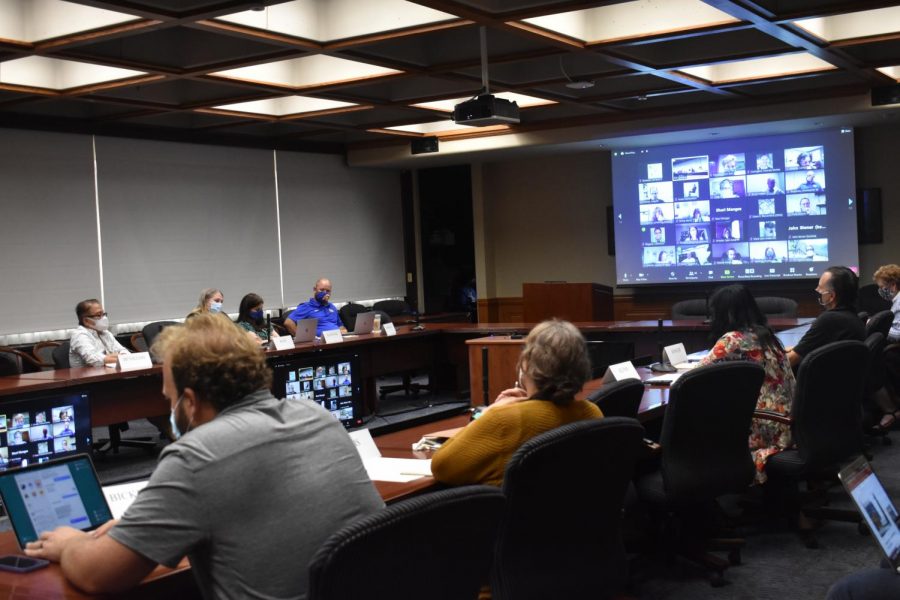Faculty Assembly discusses performance criteria, forms dependent care committee
Alyssa Carnevali | For The Pitt News
Pitt Faculty Assembly members discuss criteria used to assess professors’ scholarly pursuits on Wednesday. Members voted in favor of a dependent care committee and an academic freedom resolution.
October 8, 2021
Abbe de Vallejo said current modes of dictating faculty performance at Pitt — such as the use of a preferred journals list to measure meaningful publications for tenure or funding consideration — are insufficient in actually measuring scholarly pursuit and achievement.
“Some of us don’t publish, but we are all creative,” de Vallejo, an associate professor of Pediatrics and Immunology, said. “Like the artists, the engineers who design equipment, those should all be credited.”
Faculty Assembly met Wednesday afternoon to discuss and vote on a resolution drafted by the University Senate’s Tenure and Academic Freedom Committee highlighting that a preferred journals list does not cover all areas of faculty’s studies. The Assembly also discussed and voted on a resolution to form a dependent care ad-hoc committee and discussed current efforts from administrators to form groups exploring the possibility of a COVID-19 vaccine requirement.
Faculty Assembly previously discussed in a November 2020 meeting if a preferred journals list — a documented list of journals that departments deem as the primary area of focus in publishing — was adequate when examining faculty work when considering granting tenure, funding or other academic appointments. De Vallejo, along with Maria Kovacs, a distinguished professor of psychiatry and psychology, drafted a resolution as co-chairs of the tenure and academic freedom committee to address the use of a codified list.
While de Vallejo maintained that individual departments should determine criteria for tenure promotion retention, the resolution cautioned against the use of a preferred journals list, instead promoting a more holistic approach, letting faculty work on an area not represented on the list. According to de Vallejo, equity is at the core of this resolution.
“All relevant scholarly and creative contributions would be included in all assessments of faculty,” de Vallejo said. “It’s not just publications.”
Chris Bonneau, immediate past University Senate president and a political science professor, said a preferred journals list is not a beneficial way to gauge faculty productivity.
“If you have the existence of such a list, even if all the current faculty agree on it, it can shape future hiring and programmatic decisions,” Bonneau said. “This stifles innovation, that stifles creativity, and it has harmful long-term consequences.
Yolanda Covington-Ward, chair of the Africana studies department, echoed her support for the resolution. According to Covington-Ward, her academic field emphasizes the importance of utilizing an interdisciplinary approach. As a result, Covington-Ward said, much of her and her colleagues’ work is published in journals that are not included under an Africana studies label. Covington-Ward said with a preferred journals list dictating how faculty are evaluated, a significant portion of their research would be ignored.
“As an institution, as we try to encourage and provide the support for more interdisciplinary research and work, we have to make sure we’re not stifling those kinds of effort,” Covington-Ward said.
But Ilia Murtazashvili, an associate professor at the Graduate School of Public and International Affairs, said an inclusive process updating these preferred lists of journals might be more beneficial than limiting the existence of a list entirely. According to Murtazashvili, departments would be able to facilitate the development of their criteria for evaluation, but there would be different avenues for faculty members to shape the preferred journals list when it does not fully encompass all scholarly pursuits.
“A well-designed, preferred journals list with an inclusive process for updating would be a good way to increase the transparency and ensure that scholarly product counts,” Murtazashvili said.
Some faculty members cautioned against this. Natasha Tokowicz, a psychology professor, mentioned the importance of considering how departmental power dynamics would control the creation of a list.
“Are untenured faculty a part of that conversation, are they truly as represented as folks who are more established in the department?” Tokowicz said.
The Assembly voted 45-2 in favor of the academic freedom resolution.
The Assembly, which had options to attend the meeting in person or remotely, also discussed current efforts from the chancellor and provost’s offices to create groups that would focus on a potential vaccine requirement and related concerns, the steering committee’s approval of Pitt’s new budget model and the University’s United Way campaign.
President Robin Kear said the provost’s office is currently forming different groups in order to explore the prospect of a vaccine requirement. Kear is a member of the group examining the possible consequences for non-compliance from faculty members.
While Kear said that she already knows the opinions of the executive committee regarding a vaccine requirement, she wants to hear from the rest of the Assembly.
“I am glad of this movement towards a vaccine requirement,” Kear said. “As of this morning, I hear that the overall number for vaccination at Pitt is 92%.”
According to a Thursday email sent by Pitt’s COVID-19 Medical Response Office, more than 90% of the Pitt community — students, faculty and staff — are vaccinated against COVID-19.
Kear also introduced the formation of an ad-hoc committee that would focus on care for dependents of Pitt faculty, including elder care and child care, in conjunction with Pitt’s current dependent care initiatives.
“Policy change here can promote retention of faculty and postdocs,” Kear said. “And improve scholarly productivity and our efforts in diversity and inclusion.”
While a list of committee members hasn’t been finalized, Kear named Anna Wang-Erickson, an assistant professor of pediatrics and the associate director of the Institute for Infection, Inflammation and Immunity in Children, as the chair. Wang-Erickson received a Pitt seed grant in 2020 to put towards creating a University-wide infrastructure and policies for nonroutine dependent care support.
Pitt currently provides faculty with child care through the University Child Development Center and the recently announced Great Futures Preschool program, but the UCDC has a long waiting list and a fee structure that is dependent on economic income. Irene Frieze, a psychology professor, has worked on several different initiatives to improve and further develop Pitt’s dependent care services.
“This is very expensive care,” Frieze said. “And if the University is going to provide this care, where are we going to get the money and where is it going to come from?”
Kear acknowledged that this care can be incredibly costly for the University, but said the committee will attempt to create a solution to alleviate these concerns.
“We are going to attempt to do this from a cost neutral position,” Kear said. “And change other policies that might also be cost neutral.”
The assembly voted unanimously in favor of creating an ad-hoc committee for dependent care.
While details of the proposed ad hoc committee are still in the works, Kear said she is comfortable they are moving in the right direction.
“Anna has a great vision for this,” Kear said. “And I think, with your help, we will get more done, I hope.”



